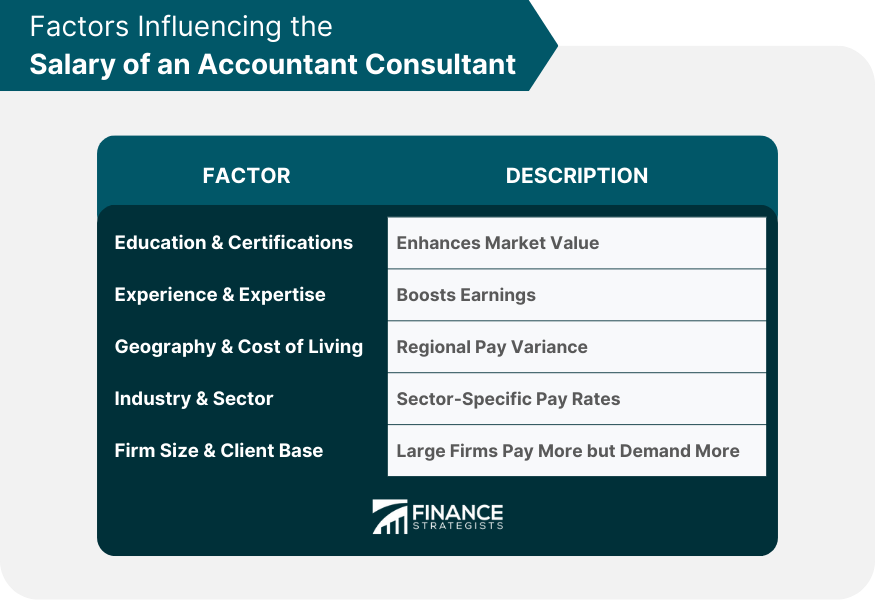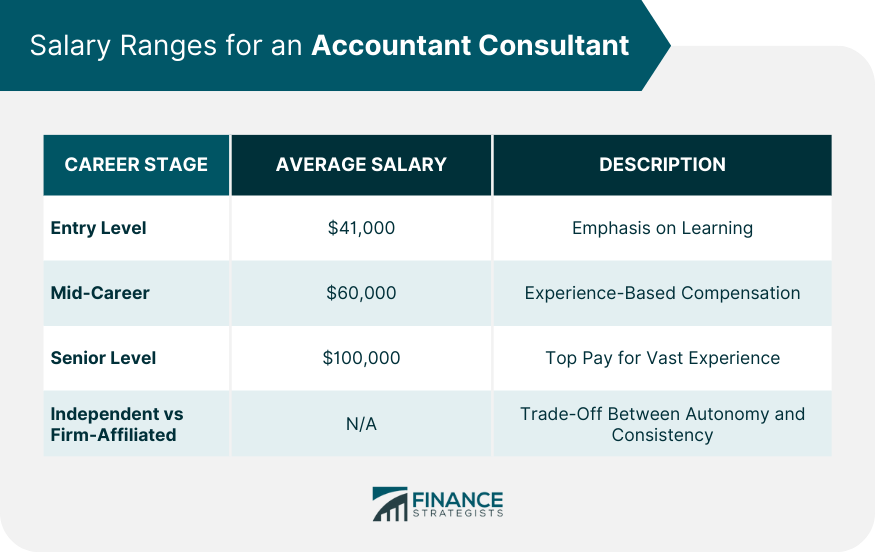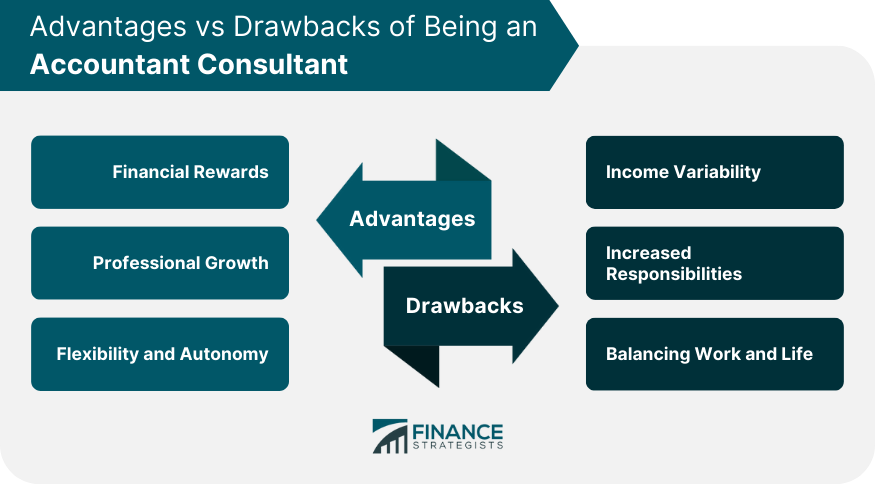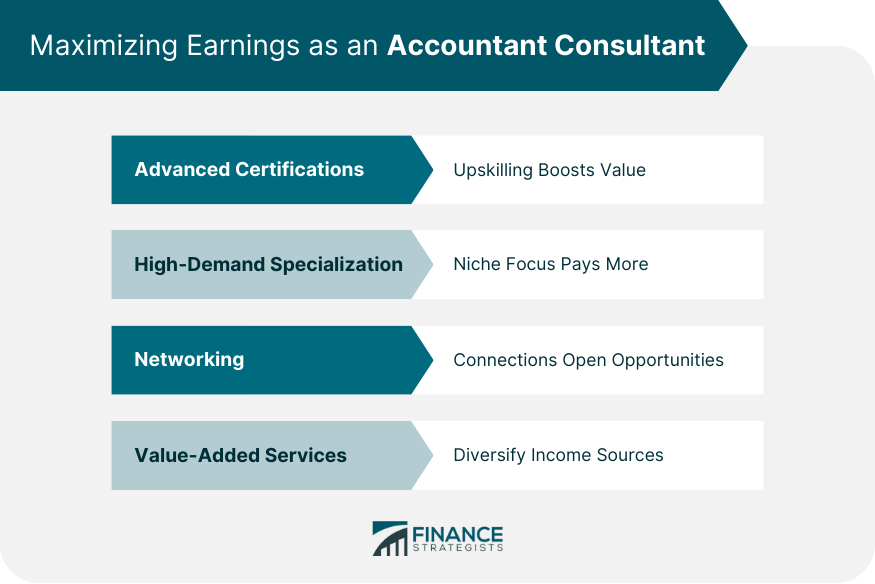An accountant consultant operates at the intersection of accounting and strategic guidance. These professionals differ from traditional accountants. Instead of merely preparing financial statements, they dive deep into data, extracting insights to steer businesses toward informed decisions. An accountant consultant merges two roles. As an accountant, they process and interpret financial data. As a consultant, they offer strategic insights rooted in this data. They are more than just number crunchers; they are strategic partners guiding financial decisions. The significance of an accountant consultant in today's business world cannot be understated. With the complexities of modern markets, businesses require more than just financial reporting; they need actionable insights. Accountant consultants bridge this gap, ensuring that organizations understand their financial status and how to leverage this information for growth and stability. Complemented by industry-recognized certifications, a solid educational foundation can significantly enhance an accountant consultant's market value. Professionals with CPA or CFA titles often have an edge, signaling their commitment to the craft and ensuring a broader knowledge base. As with many careers, tenure and specialized knowledge can propel an accountant consultant's earnings. The ability to navigate the unique financial challenges of various industries, especially niche sectors, brings added value to clients, often reflected in salary offers. Salary scales tend to mirror living costs. Major business hubs or cities with a high concentration of industries might offer beefier paychecks, reflecting the higher living expenses in those locales. However, such regions also present more opportunities and potential for growth. The industry in which an accountant consultant operates can significantly dictate their earnings. High-stakes sectors like finance or tech, which heavily rely on accurate financial forecasting and reporting, might offer more attractive compensation packages. While prestigious firms with expansive client bases might offer lucrative paychecks, they could also demand more extensive work hours and frequent travel. Conversely, focusing on a local clientele might offer a work-life balance but might come with a modest pay scale. The mean annual wage for an Accountant Consultant within the United States stands at $95,000. However, the spectrum of salaries generally encompasses a range from $85,000 to $105,000. These salary brackets can exhibit significant fluctuations based on several crucial determinants, such as educational background, certifications, supplementary competencies, and the duration of one's tenure in the field of expertise. Despite their educational achievements, those just stepping into the world of accountant consultancy might start with a baseline salary of about $41,000. It's an industry where real-world application matters significantly, so the initial phase is often seen as a learning curve. With a solid track record and a demonstrated ability to add value to clients, accountant consultants can expect a jump in compensation to around $60,000. This phase often integrates experience with industry insights, translating into higher earning potential. Veteran accountant consultants, equipped with years of experience and an extensive network, become invaluable business assets. They can charge an average of $100,000. Their deep industry insights and track record of guiding successful financial strategies place them at the top of the pay scale. Independence offers the allure of autonomy but can come with sporadic income, depending on market dynamics. Those linked with well-established firms enjoy consistent pay, though they might also split their income with the firm, affecting overall take-home earnings. The unique blend of skills that accountant consultants bring ensures that their services are always in demand, leading to competitive compensation packages. Beyond the base salary, accountant consultants often enjoy performance-based bonuses. Those tied to bigger firms might also partake in profit-sharing schemes, boosting their overall income. In consultancy, networks matter. Establishing connections with industry leaders and peers can pave the way for more significant opportunities and higher-paying projects. Diversity is a significant perk. Working with different industries provides a broader perspective, enriching the consultant's knowledge base and enhancing their problem-solving capabilities. Choosing where and how to work can be a significant advantage. Whether it's a bustling office or a serene home setup, accountant consultants often have a say. Not being tethered to specific clients or industries allows accountant consultants to pick projects aligning with their interests and expertise, ensuring job satisfaction. Economic downturns can affect businesses' willingness to spend on consultancy, leading to potential income drops for consultants. The ebb and flow of demand, influenced by market trends, can lead to uncertain income periods. Clients come with expectations. Meeting these while managing multiple projects can be a tightrope, requiring impeccable time and expectation management. Stagnation is not an option in finance. Constant upskilling and staying abreast of industry changes become paramount. The workload might surge during certain times, like tax seasons or end-of-year financial reviews, encroaching on personal time. The unpredictable nature of consultancy projects can sometimes lead to overlapping commitments and challenging work-life harmony. Continuous learning can be a significant income booster. Advanced certifications enhance skills and position the consultant as a thought leader. Zeroing in on niches, be it forensic accounting or tax consultancy for multinational corporations, can lead to better-paying projects. Strong networks often translate to more opportunities. Building and nurturing professional relationships can pave the way for lucrative projects and collaborations. Moving beyond core consultancy, like venturing into financial training or workshops, can diversify income sources. Accountant consultants play a pivotal role in steering businesses towards informed financial decisions. Their compensation, influenced by various factors, reflects the value they bring. While the career offers numerous benefits, it's full of challenges. By continuously upskilling, specializing in high-demand areas, and building robust professional networks, accountant consultants can navigate these challenges and maximize their earnings. The journey, though demanding, offers a fulfilling blend of financial rewards and professional growth.What Is an Accountant Consultant?
Factors Influencing the Salary of an Accountant Consultant
Education & Certifications
Experience & Expertise
Geography & Cost of Living
Industry & Sector
Firm Size & Client Base

Typical Salary Ranges for an Accountant Consultant
Entry Level
Mid-Career
Senior Level
Independent Consultants vs Firm-Affiliated

Benefits of Being an Accountant Consultant
Financial Rewards
Competitive Salaries
Bonuses & Profit-Sharing
Professional Growth
Networking Opportunities
Exposure to Varied Industries & Projects
Flexibility and Autonomy
Work Environment Choices
Choice of Clients and Projects
Drawbacks of Being an Accountant Consultant
Income Variability
Dependence on Economic Conditions
Fluctuations in Client Demand
Increased Responsibilities
Client Management & Expectations
Need for Continuous Learning and Skill Upgradation
Balancing Work and Life
Potential for Long Hours
Managing Workload During Peak Seasons

Maximizing Earnings as an Accountant Consultant
Pursuing Advanced Certifications and Training
Specializing in High-demand Areas
Building a Strong Professional Network
Offering Value-Added Services to Clients

Conclusion
How Much Does an Accountant Consultant Make? FAQs
An accountant consultant merges accounting with strategic guidance, offering insights to steer businesses toward informed financial decisions.
Salary depends on factors like education, experience, geography, and industry, with different pay scales for entry-level, mid-career, and senior positions.
Benefits include financial rewards, professional growth opportunities, and flexibility in the work environment and client choices.
Yes, challenges include income variability, increased responsibilities, and balancing work and personal life, especially during peak seasons.
Earnings can be optimized by pursuing advanced certifications, specializing in high-demand areas, and building a robust professional network.
True Tamplin is a published author, public speaker, CEO of UpDigital, and founder of Finance Strategists.
True is a Certified Educator in Personal Finance (CEPF®), author of The Handy Financial Ratios Guide, a member of the Society for Advancing Business Editing and Writing, contributes to his financial education site, Finance Strategists, and has spoken to various financial communities such as the CFA Institute, as well as university students like his Alma mater, Biola University, where he received a bachelor of science in business and data analytics.
To learn more about True, visit his personal website or view his author profiles on Amazon, Nasdaq and Forbes.











